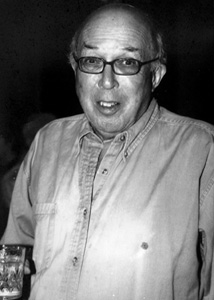 Pianist Bill Dunham was born in Boston in 1928. Even though he always had a “day gig”, for over 50 years he has appeared on Monday nights at Arthur’s Tavern on Grove Street with his band, the Grove Street Stompers. Bill owns an apartment building on Barrow Street and these days he lives with his wife, Sonya, on the corner of 14th Street and Seventh Avenue.
Pianist Bill Dunham was born in Boston in 1928. Even though he always had a “day gig”, for over 50 years he has appeared on Monday nights at Arthur’s Tavern on Grove Street with his band, the Grove Street Stompers. Bill owns an apartment building on Barrow Street and these days he lives with his wife, Sonya, on the corner of 14th Street and Seventh Avenue.
During his high school years at Williston Academy in Massachusetts, Bill Dunham would hop a bus to the city of Worcester to take accordion lessons. To him, what was “beautiful” about that city was the Family Theatre on Main Street where they featured the big bands of the day. “After my accordion lessons I would go over to the Family Theatre and sit in the balcony,” he says. “The theatre would go dark, the theme song of Les Brown’s or Harry James’ orchestra would start, the curtain would draw open, there they would be and—let me tell you—it was orgasmic. It was so exciting!”
At the same time Dunham was also taking piano lessons and while other kids were playing baseball, he was “grinding away” on the piano and hating it. “I had an old-fashioned music scroll that I would carry my music in and I looked like a kid out of Dickens,” he explains. “Then I took lessons from a swing piano teacher at Williston and things changed. The spirit and the energy and the rhythm really got to me. My previous teacher had told me to put a dime on the back of my hand and not let it move when I played. When I started taking swing lessons this teacher said, ‘For God sakes, get that dime off your hand and flop it around!’”
Dunham graduated from Williston in 1946 and joined the army. “I went to Korea where I was, among other things, a piano player in the regimental dance band,” he says. Following his Army service, Dunham attended Harvard on the G.I. Bill where he majored in economic theory as well as started a band. “We became the most popular traditional jazz band on the east coast,” he says. “We played every big weekend at Dartmouth for five years. I spent so much time with this band that—I’m embarrassed to say—it took me five years to get out of Harvard instead of four!” And after a few years of working abroad, Dunham settled in New York in 1956 to continue his corporate career.
So how did the Grove Street Stompers come about? “In 1962 I started a band with a wonderful cornet player named Jimmy Gribbon,” he recounts. “One day we walked into Arthur’s Tavern on Grove Street and spoke to the owner—an irascible fellow named Jerry Maisano—who said we could play on Mondays for no pay. So we split the tip bowl and we’ve been there ever since. Every single Monday night for fifty years! Well, we closed for President Kennedy’s funeral day in 1963 and we also closed once for Jerry’s funeral day. And we’ve had four or five weather-related closings. And we never play New Years Eve. Other than that, we’ve been here every Monday night.”
![dunham_quote_mar_2013 "[The Village] was quite different than it is now. Because rents were cheap, it was where artists and writers actually lived.](http://www.westvillageoriginals.com/wp-content/uploads/2013/04/dunham_quote_mar_2013.jpg) “When we started out at Arthur’s we were pretty much an amateur jazz band,” Dunham continues. “Our first bass player was a pilot for Eastern Airlines, for instance. The music wasn’t that hot but the enthusiasm certainly was. But gradually over the years the band has transitioned to the point that it’s now a professional band in terms of the musicians, who are pros. Except me. I’m still a rank amateur,” he says, laughing. “I always had a day gig!”
“When we started out at Arthur’s we were pretty much an amateur jazz band,” Dunham continues. “Our first bass player was a pilot for Eastern Airlines, for instance. The music wasn’t that hot but the enthusiasm certainly was. But gradually over the years the band has transitioned to the point that it’s now a professional band in terms of the musicians, who are pros. Except me. I’m still a rank amateur,” he says, laughing. “I always had a day gig!”
What was the Village like back when he started at Arthur’s? “It was interesting, and quite different than it is now,” he recalls. “Because rents were cheap, it was where artists and writers actually lived. They wrote, acted, and played and this is where it all happened. For musicians there was a law that said you couldn’t play in a place that served booze unless you had a cabaret license. So we all had to go to the police station to get finger printed. The Mafia controlled most of the bars and clubs back then as well, both straight and gay. They left Arthur’s alone, though.”
And even though the club was eventually sold, Dunham says that nothing has really changed there. “It’s one of the last real ‘joints’ in town, which makes it kind of fun to play in,” he says. “We’ve even managed over the years to increase our compensation somewhat. We actually get paid now!”
Photo: Bill Dunham
